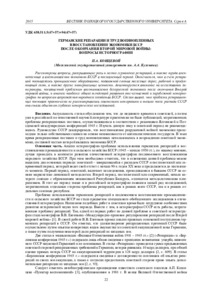Пожалуйста, используйте этот идентификатор, чтобы цитировать или ссылаться на этот ресурс:
https://elib.psu.by/handle/123456789/13453Полная запись метаданных
| Поле DC | Значение | Язык |
|---|---|---|
| dc.contributor.author | Концевой, П. А. | - |
| dc.date.accessioned | 2015-09-09T08:23:26Z | - |
| dc.date.available | 2015-09-09T08:23:26Z | - |
| dc.date.issued | 2015 | - |
| dc.identifier.citation | Вестник Полоцкого государственного университета. Серия A, Гуманитарные науки. - 2015. - № 9. – C. 22-26. | ru_RU |
| dc.identifier.issn | 2070-1608 | - |
| dc.identifier.uri | https://elib.psu.by/handle/123456789/13453 | - |
| dc.description | German Reparations and Labour of War Prisoners in the Economic Recovery of Bssr After World War II: Issues Historiography. P. Kontsevoj, (Mogilev State University. Aakuleshov) | ru_RU |
| dc.description.abstract | Рассмотрены вопросы, раскрывающие роль и место германских репараций, а также труда военнопленных в восстановлении экономики БССР в послевоенный период. Отмечается, что в счет репараций поставлялось промышленное оборудование, подвижной состав железных дорог, рабочий и продуктивный скот, а также другие материальные ценности. Акцентируется внимание на исследовании литературы, посвященной проблемам восстановления белорусской экономики после окончания Второй мировой войны, и анализе наиболее общих тенденций развития отечественной и зарубежной историографии по вопросам возрождения народного хозяйства БССР. Сделан вывод, что проблема репарационных поставок практически не рассматривалась советскими историками и только после распада СССР она стала объектом глубоких исторических исследований. = the role and place of German reparations, as well as the labor of war prisoners in the economic recovery of BSSR in the postwar period are observed. On account of reparations industrial equipment, railway rolling stock, working and productive livestock, as well as other tangible assets are delivered. the attention is focused on the study of the literature on the problems of the Belarusian economy recovery after World War II, and the most common trends in the development of domestic and foreign historiography on the revival of the economy of the BSSR are analyzed. the problem of reparation deliveries has not considered by Soviet historians and only after the collapse of the USSR, it became the object of deep historical research. | ru_RU |
| dc.language.iso | ru | ru_RU |
| dc.publisher | Полоцкий государственный университет | ru_RU |
| dc.relation.ispartof | Веснік Полацкага дзяржаўнага ўніверсітэта. Серыя А, Гуманітарныя навук | be_BE |
| dc.relation.ispartof | Herald of Polotsk State University Series A, Humanity sciences | en_EN |
| dc.relation.ispartof | Вестник Полоцкого государственного университета. Серия A, Гуманитарные науки | ru_RU |
| dc.relation.ispartofseries | Серия A, Гуманитарные науки;2015. - № 9 | - |
| dc.rights | open access | ru_RU |
| dc.subject | Исторические науки | ru_RU |
| dc.subject | Историография | ru_RU |
| dc.subject | БССР | ru_RU |
| dc.subject | труд военнопленных | ru_RU |
| dc.subject | репарационные поставки | ru_RU |
| dc.subject | германские репарации | ru_RU |
| dc.subject | послевоенное восстановление экономики БССР | ru_RU |
| dc.title | Германские репарации и труд военнопленных в восстановлении экономики БССР после окончания Второй мировой войны: вопросы историографии | ru_RU |
| dc.type | Article | ru_RU |
| dc.identifier.udc | 658.511.5(47+57)+94(47+57) | - |
| Располагается в коллекциях: | 2015, № 9 | |
Файлы этого ресурса:
| Файл | Описание | Размер | Формат | |
|---|---|---|---|---|
| 22-26.pdf | 173 kB | Adobe PDF |  Просмотреть/Открыть |
Все ресурсы в архиве электронных ресурсов защищены авторским правом, все права сохранены.